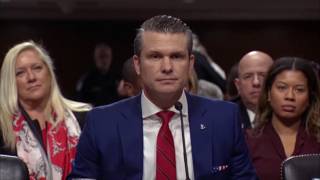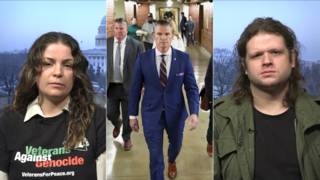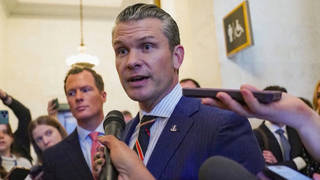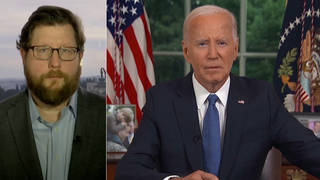
Related
Topics
Guests
- Dov KheninIsraeli lawmaker. Member of the left-wing Hadash party, a Jewish-Arab party also known as the Democratic Front for Peace and Equality.
- Jonathan Ben-ArtziIsraeli conscientious objector. He also happens to be the nephew of Benjamin Netanyahu.
Israel has rejected a French proposal for an immediate emergency forty-eight-hour ceasefire to allow humanitarian aid into the Gaza Strip. As Israeli air and sea attacks against the Strip continued into its fifth day, basic food supplies in Gaza are running low, and hospitals are struggling to cope with the rising casualties. We speak to two Israelis opposed to the assault: Dov Khenin, a Knesset member with the Jewish-Arab party Hadash; and Jonathan Benartzi, an Israeli conscientious objector who spent more than a year in prison for refusing to serve. He also happens to be the nephew of Benjamin Netanyahu, a leading proponent of attacking Gaza and a favorite to win the upcoming Israeli elections. [includes rush transcript]
Transcript
AMY GOODMAN: Israel has rejected a French proposal for an immediate emergency forty-eight-hour ceasefire to allow humanitarian aid into the Gaza Strip. As Israeli air and sea attacks against the Strip continued into its fifth day, basic food supplies in Gaza are running low, hospitals are struggling to cope with the rising casualties. Israeli Foreign Ministry spokesperson Yigal Palmor said any plan for a truce would have to make certain minimum demands on Hamas.
YIGAL PALMOR: They need to guarantee the cessation of rocket shooting. They need to guarantee the cessation of terror activities by Hamas from Gaza. They need to contain some sort of guarantee that will stop the smuggling of weapons and explosives into Gaza. Short of that, no truce plan can hold water.
AMY GOODMAN: Four Israeli citizens, including two Arab Israelis, have been killed by rockets from the Gaza Strip since Israel began its offensive on Saturday. Nearly 400 Palestinians have been killed and at least 1,600 injured. Latest reports indicate Israeli bombs have hit the network of tunnels under the Egypt-Gaza border that many have described as a “lifeline for the Palestinian people,” because it’s been a major channel for smuggling in basic supplies from Egypt. Israel maintains the tunnels are used to smuggle weapons in.
The Izz ad-Din al-Qassam brigades, the armed wing of Hamas, released a video statement Tuesday warning it would increase rocket attacks if Israel considers a ground invasion or the bombing doesn’t stop.
ABU OBAIDA: [translated] If you enter the Strip, the land of Gaza will turn into a volcano and explode in the faces of your defeated soldiers. We promise you that if you enter Gaza, the children of Gaza will collect pieces of your soldiers.
AMY GOODMAN: Meanwhile, Hamas spokesperson Fawzi Barhoum said international peace efforts are too focused on equating the situation in Gaza and Israel.
FAWZI BARHOUM: [translated] Regarding the talk about the ceasefire and engaging in calm, as they say, at the current circumstances, is an act of equating between the victim and the jailer. What is required at this moment and immediately is an Arab Islamic international effort to stop this aggression, lift the siege, open the crossings, and a rebuilding of the Gaza Strip.
AMY GOODMAN: And inside Israel, the hawkish Likud leader Benjamin Netanyahu rebuffed calls for a truce. He said on Tuesday the international community had to choose between Hamas and “the rest of humanity.” Netanyahu, who is leading the polls ahead of the elections in February, said a government under his leadership would use “all means necessary” to end Hamas’s rule in Gaza.
BENJAMIN NETANYAHU: So now the international community has a question, and I turn it back to the — to our critics, and I say you have to take a stand today. You have to tell the terrorists that this is an illegitimate operation. You cannot say both Israel and Hamas are symmetrically to blame. They’re not. One side is to blame, the side that targets civilians and hides behind civilians. That’s Hamas. The other side represents the rest of humanity. Now choose.
AMY GOODMAN: I’m joined right now on the phone from Tel Aviv by the Israeli lawmaker Dov Khenin. He is a member of the Hadash party, a Jewish-Arab party also known as the Democratic Front for Peace and Equality. Khenin has been speaking out against Israel’s military operation.
We welcome you to Democracy Now!, Dov Khenin.
DOV KHENIN: Hello. How are you?
AMY GOODMAN: It’s good to have you with us. We are also joined via Democracy Now! video stream by the nephew of Benjamin Netanyahu. He’s at Brown University. We’re speaking to him in Providence, Rhode Island. He’s an Israeli conscientious objector. His name is Jonathan Ben-Artzi. He also is a member of the Hadash party.
I’m going to start with the member of parliament in Israel. I’d like to start off by asking, the response in Israel right now to the pounding of Gaza by the Israeli military, Dov Khenin?
DOV KHENIN: Well, the most important thing to realize is that there is an opposition inside Israel to the war and to everything going on around right now in Gaza. This position is a Jewish-Arab one. On Saturday night, we had a demonstration in Tel Aviv of 2,000 young people, mainly Jews, and there are a lot of demonstrations all over Israel of Jews and Arabs opposing the war policy of the current government. This opposition is growing steadily. It is very important to know this and to understand that there are other voices in Israeli society who do not express [inaudible] a war, and they believe there is a better alternative for Israelis and Palestinians alike.
AMY GOODMAN: Jonathan Ben-Artzi, as you listen to your uncle, who is vying to lead Israel in the February elections, Benjamin Netanyahu, what are your thoughts today?
JONATHAN BEN-ARTZI: Well, it’s not — you know, it’s not only my uncle. It’s the voices of most Israelis. And what’s worrying is that it’s the voices of many — although there are many who, as Dov said, many Israelis who do oppose this, there are far more Israelis who blindly support this. And, you know, even given the war in Lebanon of two-and-a-half years ago, where Israel killed so many people and yet emerged the loser, by all accounts, of that endeavor, they once again support something similar, which is bound for failure, only after collecting hundreds or thousands of bodies of dead innocent people.
So, you know, I’m speaking to you here not as anyone’s nephew or anything like that, but just as someone who’s, you know, speaking as an Israeli — I’m not an American — and trying to speak out to Americans to tell them you don’t have to support Israel blindly. Not everything that Israel does is holy. And sometimes you have to speak firmly to Israel and tell us, tell our government, you know, stop doing this.
AMY GOODMAN: Jonathan Ben-Artzi, you are the first Israeli soldier to be court-martialed and jailed. Explain what your refusal was first about.
JONATHAN BEN-ARTZI: I refused to join the military for pacifist reasons, and I was joined by others who refused for pacifist and also political reasons regarding the occupation. And this was around 2002. And I was jailed for roughly one year and a half in Israeli military prison. Of course, it didn’t — it never made it to mainstream American media. It did make it to European media. But America — in that sense, America is actually even worse than Israel, because in Israel it was a public discussion. In America, it was completely blocked from the American people.
AMY GOODMAN: Dov Khenin, the response of the Israeli government is that this is not equal, that it was Hamas that broke the ceasefire, that they continue to fire rockets into Israel, they have killed four Israelis, two of them Arab Israelis, that this is their fault. Your response to that?
DOV KHENIN: Well, my response is, of course, I do not accept the politics of Hamas. I think that Hamas is a disaster for the Palestinians, and, you know, it doesn’t have any political program of how to solve the Israeli-Palestinian conflict. However, when I hear these speeches of right-wing Israelis, you know, it makes me wonder. You know, they do not see the fault of the Israeli government and the Israeli army in whatever is happening in Gaza. And, you know, the things happening there are really bad, you know? A lot of people are dead there. What is their fault, you know?
And the most important thing to realize is that there is an alternative. We should not go along the line of the extremists. We should not go along the line of total war between Israelis and Palestinians for generations. We should have another option, which is much better and possible, and that is the option of achieving a real and substantive peace agreement between the Israelis and Palestinians. This is the possibility that the Israel government do not accept. This is the problem.
AMY GOODMAN: Benjamin Netanyahu, the opposition leader running to head Israel in February, said Hamas openly declared its goal to eradicate the state of Israel from the face of the earth. They’re aligned with Iran, that openly declares its goal to eradicate Israel from the face of the earth. You make peace with those of your enemies who are reconciled to peace. Jonathan Ben-Artzi, your response?
JONATHAN BEN-ARTZI: Well, you know, maybe someone should go to Israel and poll Jewish Israelis how many of them think Palestinians should be eradicated off the face of the earth. You’d be surprised at the results, you know? So these, you know —-
AMY GOODMAN: Explain that further.
JONATHAN BEN-ARTZI: Well, when you’re in Israel, people there are very -— you know, I’m not a sociologist, so I would be — I would find it very hard to explain. It would be very interesting to hear someone try to explain this. But for some reason, the Israeli population, the Jewish Israeli population is very much — has a lot of hatred towards these people, although, by all accounts, I would say that they’re actually very nonviolent. If instead of Palestinians we had as neighbors Irish people and we had to deal with the IRA, I think Israel would have a much rougher time. Relatively, there is so little violence coming from the Palestinians and such terrible violence coming from Israel.
You know, it’s easy to say the Palestinians are targeting civilian Israelis, when you, as the Israeli Air Force, you know, you have huge one-ton bombs and you can drop that bomb into a crowded neighborhood, say you were targeting, you know, this and that person, and at the same time you also kill twenty other people, and that’s — how is that called? — collateral damage. So, and then you’re OK, because you targeted that one person, whereas, you know, at the same time, Israel has to remember that it does have military bases right smack in the middle of Tel Aviv, and these are also, you know, by Israel’s standards, would be legitimate military targets. So if you go into that game, you might end up being the loser. So it’s a very dangerous road.
AMY GOODMAN: Dov Khenin, you’re a member of the left-wing Hadash party, the Jewish-Arab party in the Israeli Knesset, in the parliament, known as the Democratic Front for Peace and Equality. Can you explain the Israeli government’s position on the press, the Foreign Press Association filing the challenge on behalf of 400 reporters barred from the Gaza Strip, saying an unprecedented restriction of press freedom, the world’s media unable to accurately report on events inside Gaza at this critical time? Here in the United States, Reuters, the New York Times, BBC and other publications also have complained to the Israeli prime minister. Why are journalists not allowed in Gaza?
DOV KHENIN: Well, I think that journalists are not allowed into Gaza, in order to not — to not make it possible for people around the world to see whatever is happening in Gaza right now. The situation in Gaza is terrible. You know, the people are doing surgery without, you know, any tools, without anything needed to take care, medically, of people wounded. The situation there is really terrible.
The most — the saddest thing of all is, you know, that the Israeli population also suffers, you know, because in Israel a lot of people in the southern part of Israel are now under the threat of the missiles and the rockets fired from Gaza. It is only proof that this war is a disaster. It is, of course, also a disaster for the Palestinians in Gaza, but it is also a disaster for the Israelis themselves. The only option is to stop this war and to go in the opposite direction.
AMY GOODMAN: And what would that be? What would that look like, Dov Khenin?
DOV KHENIN: Well, the first thing to do right now is to decide on immediate and total ceasefire. Now, such ceasefire should include not only the stop of bombing and the missile rockets, it should include also a lifting on the blockade on Gaza, because it is impossible to continue the situation existing before the war when one-and-a-half million Palestinians were, you know, in impossible conditions under a blockade.
And another thing that should be agreed immediately is an agreement on the release of prisoners, both Palestinian prisoners and Gilad Shalit, bringing him back to his family. Such an agreement is also possible.
Now, if we stop the war and move forward into a total and real ceasefire and lifting the blockade on Gaza, it can create the first condition for the restart of peace process between Israelis and Palestinians. Such a peace process is very, very important, because if Israelis and Palestinians will not have the horizon of hope — and the horizon of hope can be achieved only with the vision and the establishment of an independent Palestinian state alongside Israel — if such a region of hope will not be opened to the Israelis and Palestinians, things will continue to deteriorate, and the extremists will gain more and more political strength.
AMY GOODMAN: I want to thank you both for being with us, Dov Khenin, member of the Hadash party, Jewish-Arab party known as the Democratic Front for Peace and Equality, speaking to us from inside Israel; and Jonathan Ben-Artzi, Israeli conscientious objector, first to be tried by an Israeli military tribunal, served in jail for over a year, now at Brown University, a graduate student and nephew of the opposition leader running for prime minister in February, Benjamin Netanyahu.











Media Options